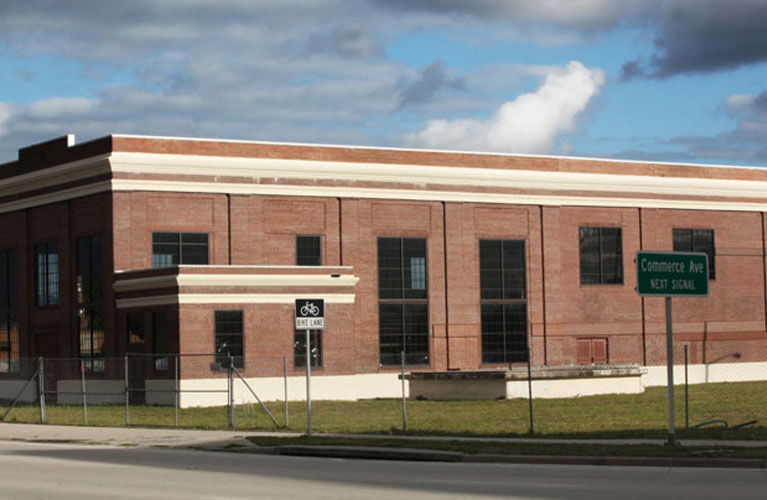
Developer Michael Rechter’s plan to turn the historic diesel power plant into a craft brewery and restaurant won the unanimous support of a committee ranking three bids for the City of Vero Beach.
Rechter says his claim that the $2.5 million project is “fully funded – there’s no borrowing required” impressed the review committee in his presentation last week. But another aspect of his bid seemed to ease their minds even more: his offer to accept responsibility for clean-up of newly surfaced petrochemical contamination.
With a March 1 vote by the city that could rapidly set negotiations with Rechter in motion, the city may believe that it is finally washing its hands of a problem that has fouled plant development plans for more than a decade.
But at least one legal expert says the city can’t be certain it’s free of liability, even if Rechter signs off on it.
“They can’t just contract it away by selling the land,” said Joel Mintz, former Environmental Protection Agency attorney and longtime professor of environmental law at Nova Southeastern University. “They can try and trust that the buyer will do the cleanup. But they were the generator of the waste, and owner and operator of the site at the time the releases occurred.”
In some scenarios, “both the new buyer and the city could be responsible,” Mintz said.
Rechter offered two bid amounts: $650,000, and a lower bid, $500,000, if he took care of environmental cleanup.
City officials have informally estimated those costs at $30,000, calling the problems “minor.”
Further, the plant’s appraised value of $500,000 was arrived at when the plant’s contamination was deemed remediated.
That was before testing in July and November showed that unacceptable levels of contaminants in the groundwater and soil around the plant had somehow returned. Those results were made known to the bidders just a week before their bids were due.
Still more recent testing has been done, but results have not yet been released to the city, according to Jim O’Connor, the city manager.
The city has already spent $300,000 on clean-up over a ten-year span, and in 2013, the state finally declared that no further action was required.
The July testing was ordered by the plant’s lessees, B-B Redevelopment, owned by developers Phil Barth and David Croom. B-B is suing the city over delays in the environmental cleanup at the plant and the city is countersuing for back rent. Through a November court-approved stipulation, B-B gave the city the right to sell the plant. The city did its own testing in November and found similar results.
City officials received three bid proposals submitted in January. Along with Rechter’s American Icon Brewery, they included sculptor and developer Ross Power’s idea to turn the plant into an art center, and petroleum terminal manager Guy D’Amico’s plan to install a craft spirits distillery.
D’Amico’s distillery concept was ranked second best; Power’s idea came in last, despite support from the Cultural Council’s Barbara Hoffman and Susan Grandpierre, who spoke to the committee on Power’s behalf.
Rechter has signed on a well-credentialed brewmaster, A.J. Stoll, who just announced on Monday he had joined a small L.A. start-up, State Brewery.
Rechter says he will join American Icon a few months prior to opening.
Before now, Stoll was director of brewing operations with Fort Lauderdale’s well-regarded Funky Buddha brewery, and formerly with a Santa Barbara, Ca. brewery called Figueroa Mountain. Stoll has been brewing professionally since 2005 after graduating from college with a degree in chemistry. Among his team’s creations there were Honey Nut Beerio and an Oreos beer.
Funky Buddha may be best known for its beer that tastes like a peanut butter and jelly sandwich. It’s currently touring its Maple Bacon Coffee Porter. That sort of creativity is propelling the craft beer industry, which in Florida is growing at the rate of one new opening a month.
Rechter, a Fort Lauderdale-based entrepreneur with a home in Vero who began investing in commercial real estate here more than a decade ago, intends to leave the brewing to the experts. But he does have experience in the food and beverage industry: the bars in his bowling alleys and billiard halls do more than $1 million a year in sales, he says.
“One of the reasons I was able to win this ranking so easily is we already have the people in our company to oversee this.”
Rechter says he intends to leave the remaining diesel engine in place in the plant, which currently has a noticeable diesel odor. He says a specialty company will excavate any contaminated material underneath the engine and then fill in the pit with concrete.
“We’re not moving the engine,” he says. “We going to return it to its original luster and build a beautiful bar around it. You’re going to be shocked.”



